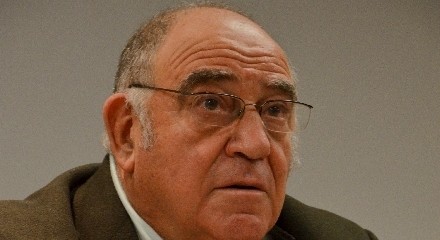19.09.2024

Missing a trick
Gaby Rubin reviews Paul du Toit (writer/director) The unlikely secret agent Marylebone Theatre
On the flyer which accompanied this play were the words, “All shall be afforded dignity” - a motto clearly dear to the heart of writer-director Paul du Toit - a South African born actor now based in Canada. Having premiered in Britain on June 9 at The Drama Factory in Somerset West, the play ran for only four days in London’s Marylebone Theatre, but will hopefully soon be performed in a venue near you.
The unlikely secret agent is the story of Eleanor Kasrils, the wife of Ronnie Kasrils. During the apartheid era Ronnie was one of the founding members, guerrilla fighters and eventually one of the leaders behind Umkhonto we Sizwe, the fighting arm of the African National Congress. Eleanor was a single mother, Ronnie’s partner and employee in a bookstore owned by her parents. But she became an important part of the secret actions of the ANC underground, until she and Ronnie were forced to leave South Africa. The sad part of their departure (they went to the UK) was that Eleanor was forced to leave her daughter behind, and did not see her for 11 years.
The play is based on the book of the same name, written by Ronnie after Eleanor’s death in 2007. The action takes place in 1963, when political protest becomes ‘sabotage’, and all resistance to the apartheid regime is crushed by government forces. One of the draconian bills passed allowed the South African Special Branch to arrest and detain for 90 days anyone they thought was involved in underground activities - incommunicado, without access to family or attorneys - and to re-arrest them as often as they wanted.
The first part of the play shows the Kasrils’ gradually blossoming relationship and Eleanor’s personal bravery, as she becomes involved in the underground resistance movement. However, there was something that neither she nor Ronnie, or anyone else in the ANC, knew at the time: there was a traitor in their midst.
Eleanor and Ronnie were involved in a series of explosions, whose targets included state assets and, cheekily, the offices of the Special Branch. But the agency was unable to locate and arrest Ronnie because he had been spirited away by Eleanor, so they arrested her, having been tipped off by their agent. The second half of the play deals with her interrogations, her time in a mental hospital instead of prison, her escape from the hospital and eventual reunion with Ronnie.
There were five actors, all South African - four men (Wessel Pretorius, De Klerk Oelofse, Sanda Shandu and Ntlanhla Kutu) and one woman (Erika Breytenbach-Marais). Each of the men took on three or four personae, switching genders and races when needed, which occasionally was a bit confusing if you did not know the story, but was a tour de force for the actors involved. Erika Breytenbach-Marais played Eleanor, of course, playing no other role, and was on the stage during the entire play. All of the actors deserve praise for the way in which they embraced their parts.
I received the impression that many in the audience had been involved in the struggle in South Africa, and so the story was probably known to them. At the end of the performance I attended, there was a standing ovation, although I was not clear if it was mainly directed in favour of the anti-apartheid political message or the actors and others involved in the play itself.
However, I had several reservations. Firstly, even if one knew the story beforehand, following the action was not always easy. The rapid changes of personnel amongst the men was at times rather confusing.
Secondly, having read both the book and the play script beforehand, I found some of the characterisations troubling - especially those of the women in the hospital.
In addition, several times, the background story was told by Eleanor, who often came to the front of the stage to talk to the audience. After a while I found this disconcerting: usually in a play (Hamlet notwithstanding) one wants the action to be shown, not told. But I got the impression that too much action was crammed into too short a play.
And, having read the book beforehand, I was also aware of its differences with the play. I am always in two minds when watching something that is supposed to be biographical. Should the viewer ignore the differences between what is biographical and how it is portrayed? Or should we accept that the two might be different, depending on the interpretation of the writer/actor/director of the play? I have not resolved this dichotomy to my satisfaction, even after many years of reading books and watching plays and films about them.
In the end, I had a curate’s egg view of the play - the politics in retrospect took me back to my youth, while watching the men do their rapid changing was fascinating. But I also think Paul du Toit missed a trick - if the play had had less of the beginning of Ronnie’s and Eleanor’s relationship and had included a scene about how they were smuggled out of the country, that would have made a very exciting closing episode.
Anyone interested in the struggles in South Africa should see it if they can. The story of the upsurge against apartheid, including the political contradictions, is instructive - especially for those who were not around at the time. But read the book too - it would please Ronnie (who left the ANC after the fall of apartheid in protest against the oppressive policies of the ANC government of the time), and give the reader a wider picture of the period, as well as the bravery of the hundreds of people who were involved in the heroic resistance against apartheid.
